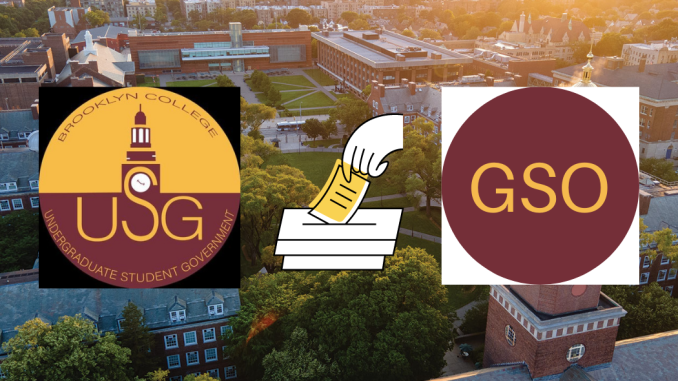
By Gabriela Flores
Elections are near for the student governments on campus. Undergraduate and graduate students can now declare their candidacy and run for several governance positions for the next few weeks. The Graduate Student Organization and Undergraduate Student Government will also collect signatures for their respective referendums to be included on ballots for official voting in March.
“A lot of people should be getting involved in student government, it’s a great way to get involved in the community you’re a part of, and as student government leaders we really do have a say in what Brooklyn College looks like,” said Carrie Ebbin, USG’s current vice president, noting that although it may be intimidating to run or become involved in student governance, it is worthwhile to commit to.
The processes for how candidates can run in USG and GSO differ. Undergraduates who are interested in running for USG president must run with a vice president under one ticket, and collect 400 signatures from the undergraduate student body by Mar. 14 to have their names added to ballots. Undergrads can also run and garner at least 100 signatures for senator positions, main and alternate University Student Senate delegates, along with main and alternate Student Disciplinarians. Before collecting signatures, also known as petitioning, candidates must fill out a campaign declaration form that verifies they are eligible to run by Mar. 7.
For graduate students who are interested in running for president, vice president, secretary, or treasurer in GSO, they must be nominated by at least two other graduate students by Mar. 13. Nominations for GSO positions are done via email to the general inboxes of GSO or Student Affairs.
USG’s petitioning form is set to be hosted on Zoho, a third-party site owned by BC’s Student Affairs, allowing undergraduates to scroll through and sign for declared candidates. These signatures do not count as official votes for the election of said candidates. The decision to host the petitioning on Zoho comes after CUNY Central, Brooklyn College’s Student Affairs, and the college’s respective student governments discussed how to effectively collect student information, that includes EMPLIDs, without compromising student privacy or allowing faulty signatures. The Zoho form will give USG candidates real-time access to their total number of signatures, and ensure that personal student information is not breached. USG will be working in “partnerhsip” with Student Affairs to create the form, according to Aharon Grama, USG’s current president.
Riding on this petitioning period are two separate referendums from GSO and USG. Each government must garner signatures from at least 10% of their respective student bodies to be officially included on ballots for voting. GSO needs approximately 240 graduates to sign for the referendum to be voted on. Among its proposals, the GSO referendum outlines a $25 increase to graduate student activity fees which are currently $16.75 per fall and spring term. The boost will go toward supporting graduate students and clubs, and GSO, including its appointment of student liaisons that bring communications from the college’s five schools to the student government.
“We haven’t had an increase in our graduate student activity fee since 1987,” said Louis Di Meglio, president of the Graduate Student Organization. “[…] We’re trying to make the effort, and honestly, we need the financial muscle for it.”
If enough signatures are garnered for the referendum to be voted on, the overall aim for GSO is to improve the experience of graduate students and expand their networking opportunities.
At the undergraduate level, the USG referendum intends to increase student activity fees from $113.40 to $120. The extra funding will benefit BC’s E-Sports and Gaming club, a video gaming group that will receive funds directly from the college instead of USG if the referendum passes. An additional $1.40 could be added to the Athletics Department’s funding. USG also proposes to dissolve the status of certain referendum groups and place them under USG’s purview or reallocate their designated funds for active student initiatives. To have this referendum on the ballot in March, USG needs about 1,300 undergraduate signatures during this petitioning period.
“There’s also small additional stuff that were already brought to the attention of the student body last year, for example, student government is interested in having a Student Activity Oversight Committee,” said Grama, noting that it will allow USG to oversee more closely if student activity funds are being used appropriately.
Following the petitioning period, students will be able to vote for their new student government leaders and possibly a referendum from Mar. 21 through Mar. 31. Undergraduate and graduate students are encouraged to punch their tickets into candidacy, and generally get involved with student politics.
“To any graduate student that’s interested, I would say, go for it – reach out,” said Di Meglio. “It’s really a matter of making sure, though, you go in eyes wide open because, at the end of the day, this is all political anyway. It’s just like out there, it’s just like politics.”
